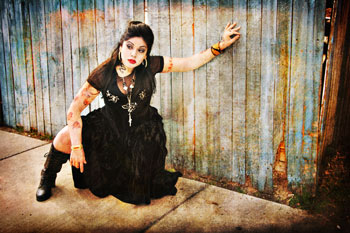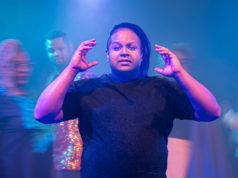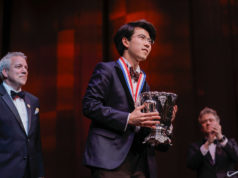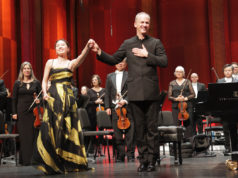Yvonne Duque first encountered playwright Luis Alfaro’s Electricidad –– a contemporary version of Sophocles’ Greek tragedy Electra set in an urban gang milieu –– in an issue of the magazine American Theatre back in 2006. She was then artistic director of Teatro de la Rosa, the resident theater company at the Rose Marine Theatre on the North Side. Staffers at the theater were excited about doing the show, but it was ultimately not approved for a mainstage production. “Back then, there was a kind of conservatism in programming that said doing something like Electricidad was scary,” Duque said. “The trend was more toward family-friendly, community theater-type material. We were disappointed.”
Things have changed a lot in the past six years. Teatro de la Rosa no longer exists, and Duque is now director of education and outreach at Artes de la Rosa, the resident multimedia arts group at the Rose Marine. Adam Adolfo is the group’s artistic director, and conservativism is not in his blood –– adventurous, high-quality fare is often seen on the Rose Marine stage these days.
[quote]We’d love if it a gang member who’d never seen a play was moved by it and if a Stage West patron who might be afraid to see something about cholo culture was surprised by how much they related to it. [/quote]Artes de la Rosa is giving Electricidad its Southwest premiere, with Duque directing and co-starring. Electra, now called Electricidad (played in the Artes de la Rosa show by Claudia Acosta), is an angry young chola who has stolen her murdered father’s body from the funeral home and keeps a vigil by it in her family’s house. Papa (Fredy Edward Quiroga) was a gang lord, and his death was a hit job ordered by Electricidad’s mother Clemencia (Duque), whose motives are complicated –– she wants to pull her neighborhood away from its violent patriarchal past, but she’s on her own power trip. Brother Orestes (Jaime Moreno) and sister Ifigenia (Raquel Lydia Leal) also figure into Electricidad’s plans for revenge on their mother, as does a Greek chorus of chimosas, or gossipy female neighbors, who constantly comment on the action. Duque insists that while Electricidad is very much steeped in a particular time, place, and culture, the goals of L.A.-based playwright Alfaro and her own production are more ambitious.
“Ideas about grieving, taking your rightful place in the family dynasty, the difficulty of forgiveness –– a lot of these are universal,” she said. “My character Clemencia is trying to change things, to start a neighborhood association to bring the gangs together, but Electricidad wants to stay with the old gang ways. Nostalgia and an inability to move on are something everyone can relate to, as well.”
Directors of past productions have interpreted Alfaro’s play in a variety of ways, from socially conscious and naturalistic to grandly tragic, expressionistic, and even satirical. Duque thought the script’s snapshots of the barrio were vivid enough by themselves; she didn’t want to veer too heavily into the Chicano political theater movement that had so inspired the playwright. Six years ago if she had directed the show as planned for Teatro de la Rosa, her version would’ve been more literal, she said, with a set that included a small barrio house and an El Camino parked outside. But artistic director Adolfo has nudged her to stage the play as what she calls “a surreal nightmare,” with Greek columns mixing with the urban electric poles and vultures looming nearby. Electricidad herself will not be the caricaturish chola that some shows have represented, angrily spitting her dialogue and flashing huge garish tattoos and outlandish Cleopatra eye makeup. Instead, she’s an unkempt young woman in jeans and a Led Zeppelin t-shirt, exhausted with grief and obsessed with killing the mother who took away her beloved father.
Duque is working with community organizations as well as the Tarrant County Juvenile Justice Center to invite ex-gang members to discuss their experiences at a talk-back after one of the Electricidad matinees. But she wants the show to be something more than another screed against gang violence, however worthy such a statement might be. “We want people to have a visceral experience at this show,” she said. “We’d love if it a gang member who’d never seen a play was moved by it and if a Stage West patron who might be afraid to see something about cholo culture was surprised by how much they related to it. Our job is to make live theater exciting.”












